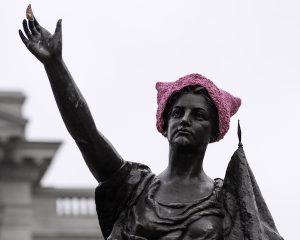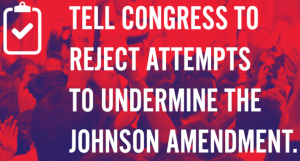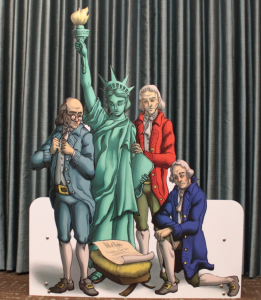Author Archives: Pat Brodbent
Roy Moore Sexual Abuse
Roy Moore Sexual Abuse & Misconduct with Minors
Roy Moore Sexual Abuse — another inveterate enemy of state-church separation has been accused of sexual abuse.
In an explosive article, the Washington Post details the story of four women who accuse Roy Moore of having inappropriate sexual conduct with them while they were in their teens and he was in his 30s. Moore is currently a candidate for the U.S. Senate seat from Alabama that Jeff Sessions vacated to be attorney general.
Roy Moore Sexual Abuse – a disgraced former judge who was dismissed!
Moore is the disgraced former judge who was dismissed from his position on the Alabama Supreme Court for refusing to comply with and uphold the Constitution — twice. FFRF has long fought with Moore, even before he placed, and refused to remove, a two-ton granite Ten Commandments in the Alabama Supreme Court building. FFRF’s Alabama chapter, the Alabama Freethought Association, sued Moore in 1995. Moore was a county judge in Gadsden, and he forced jurors to pray and displayed his handcrafted wooden Ten Commandments plaque above his bench.
The Post article details sexual misconduct that took place from 1979 through 1981. The stories of the four women share some similarities: an older man plying teenagers with alcohol, taking the girls on “dates,” and even using the prestige of his office to cultivate the relationships.
Moore’s infamy is tied to his willingness to abuse his public office to promote his personal religion. His primary loyalty as a judge was not to the law and the Constitution, but to his bible. The women’s stories reiterate Moore’s shocking disregard for public service and public office. He used his position as a district attorney to gain the trust of Nancy Wells, mother to then 14-year-old Leigh Corfman. Waiting outside a courtroom on a wooden bench, Moore approached the mother and daughter according to their retelling. Moore, whose office was down the hall, explained to the mother that she didn’t want her daughter to go into a child custody hearing, and that he, a district attorney, would watch the child. Then:
Alone with Corfman, Moore chatted with her and asked for her phone number, she says. Days later, she says, he picked her up around the corner from her house in Gadsden, drove her about 30 minutes to his home in the woods, told her how pretty she was and kissed her. On a second visit, she says, he took off her shirt and pants and removed his clothes. He touched her over her bra and underpants, she says, and guided her hand to touch him over his underwear.
Moore also used his office to get near and select another victim, Debbie Wesson Gibson, who was 17 when Moore spoke to her high school civics class.
Moore has denied the allegations the four women are making independently of one another.
Moore’s public displays of piety will no doubt be called hypocritical, but while he is certainly a monster in many respects, Moore’s alleged sexual assaults didn’t violate any of his cherished commandments. There is no prohibition of rape or child molestation in the Ten Commandments. Neither even rates mention in the supposedly highest moral law Judeo-Christianity has to offer. There is no consent requirement for sex. Even in the rest of the bible, rape is not treated as a crime against a woman, but as a crime against the man who owns the woman.
As sex scandals continue to rock churches, Hollywood, and politics, it seems that the old rule of thumb holds true: The more publicly pious an individual is, the more likely they are to be involved in a sex scandal. Ted Haggard, Dennis Hastert, Josh Duggar, Larry Craig, and the Catholic Church are but a few examples. Roy Moore is the newest addition to this list.
Women’s Rights
FFRF Condemns assault on Women’s Rights in tax Bill
The Religious Right is stealthily attacking Women’s Rights pertaining to abortion in Congress under the cover of the proposed tax bill.
“Among the biggest wins for social conservatives is the inclusion of the words ‘unborn child’ in the legislation, “reports The New York Times“. The language is contained in an innocuous provision related to education savings vehicles — so-called 529 plans, which are state-sponsored, tax-free investment funds that allow families to put aside money for a child’s college education. The provision explicitly allows expectant parents to designate a ‘child in utero’ as a beneficiary of a 529 plan.”
On some level, the proposed proviso is meaningless, since parents already can set up such accounts for children they don’t yet have and later on transfer the funds to the child’s name. But on another, it is deeply significant. By explicitly recognizing the “unborn” in federal law, the GOP leadership is fulfilling the desire of the evangelical crowd to create a legal precedent based on the religious definition of life.
Women’s Rights — Anti-abortion forces are predictably gloating!
“It is fantastic because the unborn child is appropriately represented in the tax code,” Marjorie Dannenfelser, the president of the fervently anti-choice Susan B. Anthony List, crowed to the Times. “All of these things represent a serious commitment to treating the unborn child, as she or he should be, equal and protected in the eyes of the law.”
The Freedom From Religion Foundation is alarmed at this underhanded tactic.
The primary organized opposition to reproductive rights in this country always has been religion, as FFRF co-founder Annie Laurie Gaylor has repeatedly emphasized. Virtually every vocal opponent of contraception and abortion argues against these rights on the basis of God and the bible. In fact, the Freedom From Religion Foundation came into existence in good part because of the organized religious opposition to abortion rights. It is what opened the eyes of FFRF principal founder Anne Nicol Gaylor to the dangers of dogma being enshrined in our laws.
Ever since Inauguration Day, President Trump has promised the world to the Religious Right in response to its steadfast support for his presidential campaign. And he has kept that promise multiple times — from his stringent “global gag rule” to the proposed repeal on church electioneering (the Johnson Amendment) in the same tax bill. The “unborn” language is yet another sop that the Republican Party is throwing to its base.
“This new move may seem innocuous, but it’s actually quite pernicious,” says Gaylor. “All secular forces will be battling this sneaky attempt to undermine Roe v. Wade.”
The Trump administration invites constant vigilance on the part of freethinkers — and the freethought movement willingly accepts the invitation.
Johnson Amendment
Support protection of Johnson Amendment
The Johnson Amendment is under fire by a very few! Please show your support for an amendment to the House’s tax reform bill that will keep dark religious dollars out of politics.
Among the promises made by Donald Trump during the campaign was repeal of the “Johnson Amendment,” the tax law provision that prohibits 501(c)(3) charities —  including churches — from supporting or opposing candidates for office. The congressional tax bill is delivering that promise by weakening the amendment and opening church doors to partisan shenanigans.
including churches — from supporting or opposing candidates for office. The congressional tax bill is delivering that promise by weakening the amendment and opening church doors to partisan shenanigans.
Georgia Rep. John Lewis is proposing an amendment to the House bill, scratching the provision that would eviscerate the Johnson Amendment. Please contact the House Ways and Means Committee and urge it to support this amendment.
Contact
Let our simple automated system call the committee for you with a built-in script. We encourage you to add your own thoughts to personalize the message. If you have a representative on the committee, his or her name will appear on the call list as well. As a constituent of a representative on the committee, your voice is extra-important so please make that call to him or her.
Click here to call the committee and any representatives you may have on it
Click here to email the committee
(Keep reading for more information about the Johnson Amendment and the effort to repeal it.)
Background

As part of their public trust, 501(c)(3)s file financial information with the IRS and every penny donated and spent is tracked by the government. But churches file nothing, and without the Johnson Amendment, any mega-donor could write a check to the nearest church for any amount, earmark the donation for a political campaign and take the tax write-off. Meanwhile, the church can then spend the donation on anything, including politicking. Essentially, churches would become unregulated, unaccountable super-PACs. We might even see PACs reorganizing as churches to compete for donors who would now give their donation, now tax-deductible, to churches.
During his proposal to save the Johnson Amendment, Rep. Lewis described his reaction to the effort to destroy the amendment:
“It never crossed my mind that with our notice of warning, this committee would actually consider a bill to repeal the Johnson Amendment,” he said. “It was too crazy, too unbelievable of an idea to be even possible. When I reached the end of the bill, I was shocked and appalled.”
Analysts have noted that permitting a large group of previously nonpartisan organizations to become partisan will bring much more dark money into our elections – and that money will be tax deductible.
There is massive opposition to changing this law.
Since this law came under attack, thousands have spoken out saying how important it was to them. Over 100 spiritual organizations, more than 4,200 individual religious leaders, 5,500 nonprofits (including law-enforcement groups), and nearly 100 members of Congress have signed letters detailing the damaging effects alteration of the law would have on their communities.
Recent polls show strong support for the law. Only a few individuals seeking power are behind challenges to the law, as no denomination supports changes.
These changes to the Johnson Amendment are unacceptable, and must be opposed at every level. Please support Rep. Lewis’ amendment stripping this harmful provision.
Nonbelief Relief
“Nonbelief Relief announces timely Much-Needed Grants”
A leading freethought charity is disbursing fresh grants to fight natural and man-made catastrophes currently afflicting our world.
Nonbelief Relief, a charitable organization created by the executive board of the Freedom From Religion Foundation, has announced an additional donation for hurricane-besieged Puerto Rico and new funding to aid the Rohingya refugees in Bangladesh. Nonbelief Relief has also extended a $5,000 stipend to a Bangladeshi atheist who is stranded in Nepal with his wife and child after fleeing for his life from his native country in 2015.
Generous donations from nonreligious Americans to Nonbelief Relief in October have made possible the new $10,000 grant to Americares, earmarked for Puerto Rican relief. Additionally, Nonbelief Relief has redirected $2,500, rejected by Boca Helping Hands to aid its work after Hurricane Irma hit Florida, to Atheists of Puerto Rico, for direct aid to Hurricane Maria victims.
Nonbelief Relief this week also gave $10,000 to Doctors Without Borders, to help its ongoing efforts with the Rohingya refugees, who are suffering on a “scale that we couldn’t imagine,” according to Kate White, the medical emergency manager for Doctors Without Borders in Bangladesh.
“What is happening to the Rohingya is a result of religious persecution,” says Annie Laurie Gaylor, who as FFRF’s co-president acts as administrator of Nonbelief Relief. “There should not be official or de facto national religions. In an ideal world, all governments would be secular, and religion would be an entirely private matter of conscience.”
The grants are in addition to approximately $100,00 in donations given out by Nonbelief Relief earlier this fall to secular charities, many of them providing relief to North American flooding, hurricane or earthquake victims, as well as $10,000 to the nonprofit ConPRmetidos specifically for Puerto Rico.
Nonbelief Relief is aiding a persecuted atheist teacher whose story will appear in the December issue of FFRF’s newspaper, Freethought Today. He was relocated to Nepal by Forum-Asia and has been helped by several groups, including Amnesty International, but those grants have run out. He is not considered a legal immigrant in Nepal and is trying to relocate to another country with the help of some human rights organizations.
Nonbelief Relief Inc. is a humanitarian agency for atheists, agnostics, freethinkers and their supporters to improve this world, our only world. It seeks to remediate conditions of human suffering and injustice on a global scale, whether the result of natural disasters, human actions or adherence to religious dogma. Such relief is not limited to but includes assistance for individuals targeted for nonbelief, secular activism or blasphemy.
Your donation will make a difference by furthering Nonbelief Relief’s work, in the name of atheists, agnostics and other freethinkers. Nonbelief Relief has no overheard costs and all donations go for charitable purposes. Nonbelief Relief is a separate entity from FFRF, but donations can be given via FFRF, making your donation deductible for income-tax purposes.
Donate to Nonbelief Relief
FFRF files Amicus Brief against Anti-gay Cake Maker
FFRF files Amicus Brief against Anti-gay Cake Maker!
The Freedom From Religion Foundation has filed an amicus brief in the famous case currently before the U.S. Supreme Court about whether a baker can refuse a cake to a gay couple.
Masterpiece Cakeshop Ltd. v. Colorado Civil Rights Commission seeks to radically redefine “religious freedom” as the right to impose one’s religious beliefs on others. Commercial businesses seeking exemptions from anti-discrimination laws are a prime example of this alarming argument. A Colorado baker refused to bake a cake for a gay marriage, contending his rights under the Free Exercise Clause of the First Amendment let his place of public accommodation discriminate against gay customers.
The Supreme Court has historically rejected free exercise challenges to neutral laws that regulate action, especially actions that harm other citizens. Interpreting a free exercise right to be exempted from anti-discrimination laws would have no practical limits, inviting discrimination against all protected classes not only in places of public accommodation, but many other contexts, FFRF asserts. This interpretation would also violate Establishment Clause principles by singling out religiously motivated action for special exemption from civil laws.
“The legitimate powers of government extend to such acts only as are injurious to others,” Thomas Jefferson remarked. “But it does me no injury for my neighbor to say there are twenty gods, or no god. It neither picks my pocket nor breaks my leg.” If one’s religion, however, mandates picking pockets and breaking legs, that conduct comes under the purview of our secular law, FFRF contends. To do as the bakery asks would grant a license to pickpockets and leg-breakers, so long as they themselves believed that license to be divinely inspired.
There is no logical or practical way to draw a line between religiously motivated racial discrimination and racial discrimination motivated by nonreligious beliefs. In the 1960s, Maurice Bessinger, refused to let a minister’s wife enter his South Carolina barbeque joint because she was black. Bob Jones, the televangelist and founder of an eponymous religious school, infamously declared that segregation was scriptural in a 1960 Easter sermon.
The state of Colorado has sought to prevent harm by including sexual orientation as a class protected by law against discrimination in places that sell goods and services to the public. The Free Exercise Clause of the First Amendment does not mean that anyone with a religious objection be permitted to disregard this religiously neutral anti-discrimination law.
Elevating religion and actions based on religious beliefs above the law by granting them exemptions to general and neutrally applicable laws will create chaos and have far-reaching effects, FFRF maintains.
Discrimination against Jews will increase, for instance. If there is a right to refuse service to a protected class because one’s religious belief demands it, Jews may be among the first to feel the sting of this massive redefinition of the law. But they will not be the only ones.
Discrimination against atheists will increase, too. The bakery admits that its owner refuses to design custom cakes that “promote atheism,” along with those that promote “racism, or indecency.” Given that the company regards selling any wedding cake to a gay couple as “promoting gay marriage,” it’s easy to see how a desire not to “promote atheism” might similarly result in a refusal of service based on a customer’s atheism.
“The Free Exercise Clause cannot be interpreted in a way that would undermine the Establishment Clause,” FFRF’s brief states. “A ruling in the bakery’s favor would create an interpretation that prefers, favors and promotes religion over non-religion. Such a decision would undermine long-settled and critically important principles under the First Amendment’s Establishment Clause.”
The U.S. Supreme Court has never held that the Free Exercise Clause requires an exemption from neutral laws regulating conduct. It should decline to do so now and uphold the decision of the Colorado Court of Appeals, FFRF argues to the Supreme Court in its brief.
FFRF’s interest in this case arises from the fact that most of its members are atheists or nonbelievers, as are the members of the public it serves as a state/church watchdog. The Freedom From Religion Foundation, a national nonprofit organization based in Madison, Wis., is the largest association of freethinkers in the United States, representing more than 29,000 atheists and agnostics, 10 percent of whom identify as LGBTQ. A ruling that state and local governments must tolerate religiously motivated discrimination in places of public accommodation would invite discrimination against atheists, agnostics and other freethinkers, severely impacting FFRF’s members and FFRF’s work to uphold freedom of conscience under the First Amendment.
FFRF’s Managing Staff Attorney Rebecca Markert is the Counsel of Record on the brief, with principal writing by FFRF Staff Attorney Elizabeth Cavell, and help from FFRF attorneys Andrew Seidel, Patrick Elliott and Sam Grover.
Click here to read this and other FFRF news releases directly at FFRF’s website. Please help educate by spreading the word.
Texas Governor Abbott Loses Censorship Suit!
BREAKING NEWS!
FFRF WINS, TEXAS GOV. ABBOTT LOSES IN SOLSTICE CENSORSHIP SUIT
The Freedom From Religion Foundation has prevailed in federal court against Texas Governor Greg Abbott, who ordered the removal of FFRF’s winter solstice Bill of Rights Nativity from the Texas Capitol in 2015.
FFRF can Sue Governor Greg Abbott in his Personal Capacity!
In his decision, handed down late on Friday, Oct. 13, U.S. District Judge Sam Sparks for the  Western District of Texas – Austin Division, ruled that Abbott violated FFRF’s free speech rights.
Western District of Texas – Austin Division, ruled that Abbott violated FFRF’s free speech rights.
FFRF had placed a duly permitted display celebrating the Winter Solstice and Bill of Rights Day, in response to a Christian nativity at the Texas Capitol. The display, depicting founding fathers and the Statue of Liberty celebrating the birth of the Bill of Rights (adopted Dec. 15, 1791), had the requisite sponsorship from a Texas legislator.
Abbott, as chair of the Texas State Preservation Board, ordered FFRF’s display taken down only three days after it was erected, lambasting it as indecent, mocking and contributing to public immorality.
“Defendants have justified removal of FFRF’s exhibit by arguing the exhibit’s satirical tone rendered it offensive to some portion of the population. That is viewpoint discrimination,” writes Sparks in a 24-page ruling. The court also held that a reasonable official in Governor Abbott’s position would have known that removing FFRF’s display based on its viewpoint would violate FFRF’s First Amendment rights, thus FFRF can sue Governor Abbott in his personal capacity.
“It is ‘beyond debate’ the law prohibits viewpoint discrimination in a limited public forum,” Sparks ruled.
Judge Ruled in Favor of FFRF Deposing Governor Greg Abbott!
Sparks did not find that Abbott’s actions violated the Establishment Clause. He also ruled in FFRF’s favor that FFRF has the right to depose the governor for one hour. Abbott had fought the request for a deposition.
FFRF Co-President Annie Laurie Gaylor praised the ruling as a very strong decision for FFRF, for free speech and for the rights of nonbelieving citizens. “We’d rather keep divisive religious — and irreligious — views out of state capitols. But if the government creates public forums, and permits Christian nativities in them, there must be room at the inn for the rest of us.”
FFRF is a national state/church watchdog with more than 29,000 nonreligious members. It requested the right to put up a December display at the request of some of its more than 1,200 Texas members.
The case is Freedom From Religion Foundation v. Governor Greg Abbott, Cause No. A-16-CA-00233-SS. FFRF was represented by Attorney Richard L. Bolton with FFRF Attorney Sam Grover as co-counsel. More history about the case may be found here.
FFRF is a National watchdog for violations of our 1st Amendment, specifically involving the Separation of Church and State. If you see an violations and need help or support you can Contact FFRF National. There are also dozens of local chapters, see Local Chapters.
Freedom from Religion Metro Denver Chapter is one such very strong local chapter. FFRF Metro Denver, as well as National and most local chapters, is a non-profit 501(c)3. The Metro Denver chapter’s mission is to participate on the local level to safeguard the constitutional provision of church/state separation, with a primary focus of educating others in the community on this critically important issue.
For tax-deductible donations see FFRF Metro Denver Chapter. To join the Denver Chapter visit FFRF Metro Denver Membership.
Freedom of Speech and Football
O say can you kneel? Free speech and football
By Andrew L. Seidel
Director of Strategic Response
Freedom From Religion Foundation
Freedom of speech is both a constitutional right and a core American value. As a constitutional right, it means the government cannot limit your right to speak.
Obviously, private employers aren’t the government. Private organizations can regulate the speech of employees and participants. This is bad news for those receiving tips at Cold Stone Creamery and has implications for the NFL players who choose not to stand during the national anthem. It’s also bad news for two students who were humiliatingly forced off their private, Christian football team, by their pastor coach for choosing to peacefully protest during the national anthem.
The government can regulate the conduct of its employees. In fact, the Constitution requires the government to regulate employee speech while they are on the clock—under the Establishment Clause government actors may not endorse religion while representing the government. Teachers in public schools don’t have a free speech right to preach to other people’s children because they are acting as government employees and bound by that clause.
But in most cases, the government cannot put speech demands on private citizens, including students in our public schools. The recent political push to force citizens to stand during the national anthem has bled into the public schools, where kids are beginning to emulate professional athletes and are becoming more politically aware as a result.
Piety and patriotism never mix well. Religion suffocates dissent, our Constitution enshrines it. Image via Shutterstock/Igor Stevanoic. Public schools, such as Parkway High School in Bossier Parish, La., are bound by the First Amendment’s Establishment and Free Speech Clauses. That means the school cannot punish a student for exercising his or her First Amendment rights, including the right to “take a knee” for the national anthem. (It’s nice to see the prayerful import of “take a knee” morph into something more secular and worthwhile.) If a school punishes such a student, it is violating the free speech clause of the U.S. Constitution. We’re looking at you, Parkway High.
The Supreme Court ruled more than 70 years ago in West Virginia State Board of Education v. Barnette that compelling a student to recite the pledge and salute the flag infringes upon a student’s First Amendment rights. The Barnette ruling was issued more than a decade before Congress divided “one nation, indivisible” by inserting “under God” into the then secular pledge. The court explained, in truly eloquent language, the limits on our government:
If there is any fixed star in our constitutional constellation, it is that no official, high or petty, can prescribe what shall be orthodox in politics, nationalism, religion, or other matters of opinion or force citizens to confess by word or act their faith therein.
Damn right. FFRF attorneys regularly quote this fine prose in our complaint letters. Those letters are often sent to protect nonreligious students who don’t want to stand for a pledge to one nation, under a god that they do not believe in.
The opposition to protests during the anthem will inevitably bleed into the public schools. This threatens nonreligious students who want to sit down for their rights and opt out of the pledge. If you or your child or a friend see this happen, please report it to FFRF legal using this web form. FFRF is here to protect the rights of these brave children.
God Gets Roasted by a comedian
God Gets Roasted
Delta high school student sues Delta County Joint School District
By KIRK MITCHELL | The Denver Post
A former Delta high school student sued the Delta County Joint School District No. 50 claiming teachers gave the A-student a failing grade and sabotaged her college applications because of her atheistic views and opposition to religious proselytizing and instruction in the public school.
Denver attorneys Jeffrey Springer and Andrew Reid filed a civil lawsuit Monday on Cidney Fisk’s behalf in U.S. District Court in Denver against the district and school officials.
Fisk is seeking compensatory and punitive damages for economic losses, emotional distress and humiliation.
District Superintendent Caryn Gibson, who was named as a defendant in the case, declined to comment about the lawsuit because the district has not been served and does not know Fisk’s allegations.
During her senior year in 2015-16, Fisk had a 4.1 grade point average, was captain of the school’s speech and debate team, student body treasurer and a reporter on the student magazine, the Delta Paw Print.
But her opposition to teachers, school board members and administrators, who she claims espoused religious views in school settings and meetings put her at odds with them, the lawsuit says. For example, school board member Kathy Svenson, a Bible camp teacher, once stated her “Christian” belief at a school board meeting that “transgender students should be castrated,” it says.
When Fisk and other students wore costumes in 2014 in opposition to state Amendment 67, which sought “personhood” status for fetuses, a teacher told her to take the costume off because “God gave babies life and abortion is murder,” the lawsuit says.
The following year, in 2015, the same teacher, called Fiske into a meeting and criticized her “attitude” for posting pictures on her private Instagram account of her wearing a school T-shirt at a school football game with hashtags including #notactuallyafan. She was told her attitude was “not suitable as a student leader.”
At the meeting, a counselor warned her that she could be removed from her student government position and lose college scholarship opportunities, the lawsuit says.
When Fisk questioned the principal and other school administrators about the legality of having a faith-based instructor speak about sex education at a mandated school assembly, she was told the religious tones would not hurt anybody, the lawsuit says.
For a decade, the school has paid Shelly Donahue, who teaches abstinence as the only way to prevent pregnancy, the lawsuit says. Her website says she is “passionately committed to Jesus Christ as the ultimate answer to the teen sexual activity problem in America.”
Fisk and friends wore T-shirts before the presentation that said “I prefer science,” and “I abstain from ideology.”
“Ms. Donahue’s presentation at the school was expressly and overtly faith-based, religious in content and tone,” and lacked medically accurate information about contraceptives and sexually transmitted diseases including AIDS, the lawsuit says. She told students that sex before marriage “puts you further from God” and compared girls who have premarital sex to dirty diapers, the lawsuit says.
Fisk wrote an article for The Paw Print that was critical of the presentation.
When John Miller, her government teacher, invited a Navy Seal to speak about drug abuse and his book, “Seal of God,” which mentioned his religious conversion, Fisk asked him “pointed questions about his qualifications.” Miller later reprimanded her and changed her grade from a 98 to a 70, the lawsuit says.
Fisk received death threats before and after she was quoted in an April 1, 2016, Daily Sentinel article about her opposition to a middle school program called “Donuts with Dan,” in which a teacher gave students doughnuts and Gideon Bibles. When Fisk reported the threats to the principal, nothing happened, the lawsuit says.
After the article was published, Miller dropped Fisk’s grade in his class to an F. She then spoke with Miller and the principal. Both told her repeatedly that her grade was a consequence of her comments in the newspaper. They told her if she wanted her grades to rise, she should “shut up.”
The principal barred Fisk from giving a graduation speech even though it was a school tradition that student council officers give speeches, the lawsuit says. Although her GPA qualified her for the National Honor Society program school, officials denied her that opportunity. Bad reviews by school officials also hurt her chances for scholarships and acceptance at two colleges, she claimed.
Fisk was hospitalized and suffered two anxiety attacks as a result of her experiences at school, the lawsuit says.
“Defendants retaliated upon plaintiff Fisk, threatened, punished and censored her, for expressing her opinions on religion, abortion, sex education, and drug education in an attempt to chill, deter and restrict (her) from freely expressing her opinions,” the lawsuit says.

